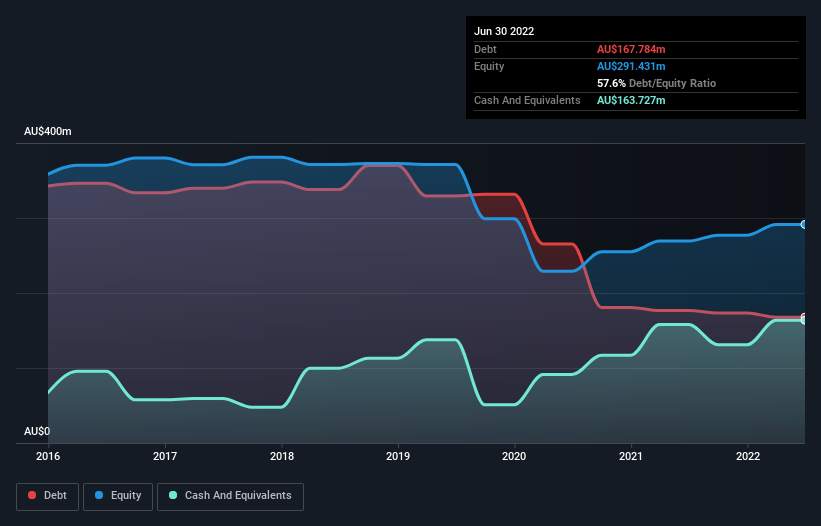- Australia
- /
- Professional Services
- /
- ASX:MMS
McMillan Shakespeare (ASX:MMS) Seems To Use Debt Quite Sensibly

Some say volatility, rather than debt, is the best way to think about risk as an investor, but Warren Buffett famously said that 'Volatility is far from synonymous with risk.' It's only natural to consider a company's balance sheet when you examine how risky it is, since debt is often involved when a business collapses. We note that McMillan Shakespeare Limited (ASX:MMS) does have debt on its balance sheet. But is this debt a concern to shareholders?
What Risk Does Debt Bring?
Debt is a tool to help businesses grow, but if a business is incapable of paying off its lenders, then it exists at their mercy. Part and parcel of capitalism is the process of 'creative destruction' where failed businesses are mercilessly liquidated by their bankers. While that is not too common, we often do see indebted companies permanently diluting shareholders because lenders force them to raise capital at a distressed price. Of course, debt can be an important tool in businesses, particularly capital heavy businesses. When we examine debt levels, we first consider both cash and debt levels, together.
Our analysis indicates that MMS is potentially undervalued!
How Much Debt Does McMillan Shakespeare Carry?
The image below, which you can click on for greater detail, shows that McMillan Shakespeare had debt of AU$167.8m at the end of June 2022, a reduction from AU$176.5m over a year. However, because it has a cash reserve of AU$163.7m, its net debt is less, at about AU$4.06m.

A Look At McMillan Shakespeare's Liabilities
We can see from the most recent balance sheet that McMillan Shakespeare had liabilities of AU$145.1m falling due within a year, and liabilities of AU$243.4m due beyond that. Offsetting this, it had AU$163.7m in cash and AU$35.3m in receivables that were due within 12 months. So its liabilities total AU$189.5m more than the combination of its cash and short-term receivables.
Since publicly traded McMillan Shakespeare shares are worth a total of AU$961.8m, it seems unlikely that this level of liabilities would be a major threat. However, we do think it is worth keeping an eye on its balance sheet strength, as it may change over time. Carrying virtually no net debt, McMillan Shakespeare has a very light debt load indeed.
In order to size up a company's debt relative to its earnings, we calculate its net debt divided by its earnings before interest, tax, depreciation, and amortization (EBITDA) and its earnings before interest and tax (EBIT) divided by its interest expense (its interest cover). This way, we consider both the absolute quantum of the debt, as well as the interest rates paid on it.
With debt at a measly 0.025 times EBITDA and EBIT covering interest a whopping 22.1 times, it's clear that McMillan Shakespeare is not a desperate borrower. So relative to past earnings, the debt load seems trivial. On the other hand, McMillan Shakespeare saw its EBIT drop by 4.5% in the last twelve months. That sort of decline, if sustained, will obviously make debt harder to handle. When analysing debt levels, the balance sheet is the obvious place to start. But ultimately the future profitability of the business will decide if McMillan Shakespeare can strengthen its balance sheet over time. So if you're focused on the future you can check out this free report showing analyst profit forecasts.
Finally, a business needs free cash flow to pay off debt; accounting profits just don't cut it. So we always check how much of that EBIT is translated into free cash flow. Over the last three years, McMillan Shakespeare actually produced more free cash flow than EBIT. That sort of strong cash conversion gets us as excited as the crowd when the beat drops at a Daft Punk concert.
Our View
McMillan Shakespeare's interest cover suggests it can handle its debt as easily as Cristiano Ronaldo could score a goal against an under 14's goalkeeper. But truth be told we feel its EBIT growth rate does undermine this impression a bit. Taking all this data into account, it seems to us that McMillan Shakespeare takes a pretty sensible approach to debt. While that brings some risk, it can also enhance returns for shareholders. The balance sheet is clearly the area to focus on when you are analysing debt. However, not all investment risk resides within the balance sheet - far from it. Case in point: We've spotted 1 warning sign for McMillan Shakespeare you should be aware of.
When all is said and done, sometimes its easier to focus on companies that don't even need debt. Readers can access a list of growth stocks with zero net debt 100% free, right now.
New: Manage All Your Stock Portfolios in One Place
We've created the ultimate portfolio companion for stock investors, and it's free.
• Connect an unlimited number of Portfolios and see your total in one currency
• Be alerted to new Warning Signs or Risks via email or mobile
• Track the Fair Value of your stocks
Have feedback on this article? Concerned about the content? Get in touch with us directly. Alternatively, email editorial-team (at) simplywallst.com.
This article by Simply Wall St is general in nature. We provide commentary based on historical data and analyst forecasts only using an unbiased methodology and our articles are not intended to be financial advice. It does not constitute a recommendation to buy or sell any stock, and does not take account of your objectives, or your financial situation. We aim to bring you long-term focused analysis driven by fundamental data. Note that our analysis may not factor in the latest price-sensitive company announcements or qualitative material. Simply Wall St has no position in any stocks mentioned.
About ASX:MMS
McMillan Shakespeare
Provides salary packaging, novated leasing, disability plan management, support co-ordination, asset management, and related financial products and services in Australia and New Zealand.
Fair value with acceptable track record.
Similar Companies
Market Insights
Community Narratives



